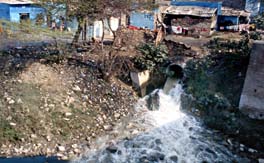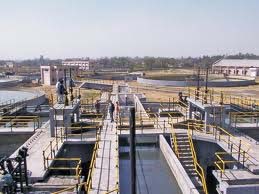/topics/contamination-pollution-and-quality
Contamination, Pollution and Quality
Jalanidhi-2 programme of the Kerala Rural Water Supply and Sanitation Agency
Posted on 06 Oct, 2011 03:20 PMThis report deals with environmental assessment and environmental management framework for the World Bank supported Jalanidhi-2 programme of the Kerala Rural Water Supply and Sanitation Agency (KRWSA), an important player in rural water supply and sanitation sector of the state.
Polluted river stretches in India: Criteria and status - A report by Central Pollution Control Board
Posted on 04 Oct, 2011 10:53 PMThis brief report by the Central Pollution Control Board (CPCB) presents an analysis of the monitoring of the water quality in India under the National Water Quality Monitoring Programme. The water quality data for the years 2002-2008 has been analysed and monitoring locations exceeding the water quality criteria have been identified as polluted locations with respect to risk.
Water and wastewater analysis – A guide manual by Central Pollution Control Board
Posted on 03 Oct, 2011 10:14 PM This guide manual on water and wastewater analysis prepared by the Central Pollution Control Board (CPCB), caters to the need of evolving a simplified code of practice for the lab
This guide manual on water and wastewater analysis prepared by the Central Pollution Control Board (CPCB), caters to the need of evolving a simplified code of practice for the lab
Cabinet approves new Mines and Minerals Development and Regulation Bill (2011)
Posted on 01 Oct, 2011 11:42 AMContent courtesy: Press Information Bureau
![]()
The Cabinet has taken a decision to place a proposal with Parliament to introduce the Mines and Minerals (Development and Regulation) Bill (MMDR Bill), 2011, in terms of the National Mineral Policy, 2008 and also repeal the existing Mines and Minerals (Development and Regulation) Act, 1957.
Institutionalization of users' level - Water quality monitoring and surveillance in Gujarat - A report by WASMO
Posted on 26 Sep, 2011 11:39 AMThe programme focused on community involvement in assessing and evaluating water quality.
Revised guidelines for the centrally sponsored scheme of Common Effluent Treatment Plants (CETPs) - Ministry of Environment & Forests, 2011
Posted on 25 Sep, 2011 06:03 PM
Image courtesy: www.projectsmonitor.com
Under the Water (Prevention and Control of Pollution) Act, 1974, every industry has to provide adequate treatment of its effluents before disposal, irrespective of whether it is in stream, land, sewerage system of sea. The small scale industrial units (SSI), which are presently defined as units whose plant and machinery are valued at less than Rs. 5 crore occupy an important place in the country's economy. The SSIs are a major contributor to the total industrial pollution load of the country. However, only a small fraction of the effluent discharge from these units is estimated to be treated as on date.
Evaluation of Central Pollution Control Board (CPCB) – A report by Indian Institute of Management Lucknow
Posted on 25 Sep, 2011 02:41 PMThis evaluation report by the Indian Institute of Management (Lucknow) of the Central Pollution Control Board (CPCB), a central institution established to set environmental standards for all parts of the country focuses on strengthening of CPCB and its preparedness to undertake various measures as suggested by environmental statutes.
Water for Indian cities - Government practices and policy concerns - Issue Brief - Observer Research Foundation
Posted on 24 Sep, 2011 04:50 PMThe urban expansion in India has not been met by a similar expansion in infrastructure and basic services. This has severely affected the quality of urban life and economic growth.
State geology and mineral maps – Geological Survey of India Miscellaneous Publication Series
Posted on 24 Sep, 2011 04:07 PMThe Geological Survey of India (GSI) has been preparing state geology and mineral maps as a part of its Miscellaneous Publications series from time to time. During the span of three and a half decades since the first edition was published, enormous knowledge has been added in the sphere of geology of the areas necessitating revisions. The entire modified and updated series published at various points of time is available here.





